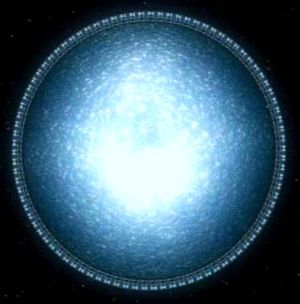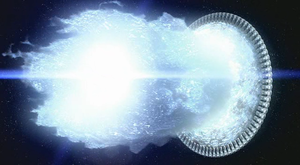



The Hermod Supergate is a subtype of the Hermod Gate. Instead of using a fixed ring for generation of a wormhole, this gate uses a variable number of blocks which are linked by phased plasma which binds the gate blocks together and allows them to function as a unified ring. The original gate itself is modified from the Type 3 Stargate for the primary purpose of Trans-Dimensional travel to other realities at Janus Station. While the original technology used, wormhole allowed only one-way travel. Integrating the Avali technology allows the wormhole to travel both ways between realities.
Block Size / Composition
- Size
- 15 by 10 by 7 meters
- Power Source
- Deuterium Fusion Reactors x 2 (Standard Block)
Matter/Anti-Matter Reactor (Reactor Block) - Construction
- Neutronium-Tritanium Alloy
- Blocks Required
- 18 Blocks per 1 kilometer Circumference
Most blocks that make up a Supergate are standard blocks. The more blocks the larger the gate can be, each block provides a portion of the power and matter-stream storage / transmission capacity of the entire gate. Since gate travel requires a significant amount of power, each block provides port from 2 fusion reactors fueled by deuterium. Specialized blocks called reactor blocks provide a significant surge of power to actually initiate a wormhole connection.
Blocks are 12.78 meters apart from one another, standard though this can vary somewhat depending on variations of gate circumference. The smallest possible Supergate is 1 km diameter (3.1 km circumference) with 56 blocks and 3 Matter/Anti-Matter reactors. There should be at least 1 M/AM reactor per km circumference.
Power Source
The Supergate is powered by a series of 14 matter/antimatter reactors placed at equal-distant points built into the gate-blocks at those points. When activated the reactors provide the power to open the gate and maintain the wormhole. However, the power is drained from the system faster than the reactors can produce it, since the blocks were designed to operate from a planet-sized (or larger) quantum singularity.
Choosing a Destination
The nature of different realities in the multiverse makes travel to an alternate reality extremely costly in energy and control. Using Janus Coordinates the gate can be targeted to any reality for which the coordinates are confirmed. Coordinates should be confirmed by Janus Station prior to being used.
Direct Dial
Each Supergate has its own unique 9-symbol address as with any other gate. The system will not allow locking on to a Supergate from a normal gate or vise versa without a priority override command.
Relative Dial
To avoid ambiguous addresses if a Supergate is located near a standard Hermod Gate, a Supergate can only be dialed from another Supergate. Since the aperture of a wormhole at the gate is the limiting factor, one would never want to dial a normal gate to a Supergate or vise versa anyway. If one does, for whatever reason, require dialing a Supergate address in full the Supergates have an option 8th symbol which designates that one is dialing a Supergate and only a Supergate. This is useful when requesting a specific gate open a wormhole without a receiving gate, as it specifies that the destination gate is a Supergate even if a normal gate shares the same 7-Symbol address.
Conventional Travel
It is also possible to use the Supergate to open a wormhole to somewhere within our own universe, given the proper coordinates and power usage, it may even be possible to access other galaxies using the gate.
Communication
A specific kind of beacon is used, based on a design for a temporal transponder, to signal the gate to open on demand to a particular universe, the signal will cross realities to reach the system and allow the gate to be activated, it cannot be activated from the opposite end. This beacon is known as a Trans-Dimensional Beacon, Janus Station and Tharsis monitors for signals of this type so that it can activate the gate.
Restrictions
The wormhole stays open for a limited time before it exhausts the energy built up by the reactors. A wormhole can only stay open for a maximum of 38 minutes before it reaches a point that the reactors can no longer sustain. The reactors then require another 12.6 minutes to recharge the gates power reserves before they can open another stable wormhole.